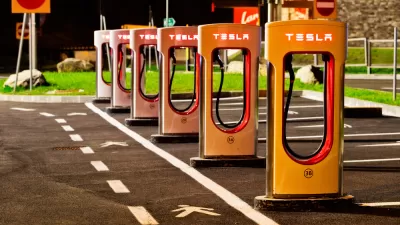A bill will attempt to bring some equity to the flagrantly inequitable rebate program that subsidizes purchases of Electric Vehicles. Additional subsidies would be directed to low income families. Rebates could also be used for car share and transit.
First, the good news: Sales of electric vehicles (EVs) have increased, though not nearly as much as the the California Air Resources Board (CARB or ARB) would like in order to reach its goal of have 1.5 million EVs on the road by 2025.
The bad news: From an equity perspective, California's Clean Vehicle Rebate Project has a long ways to go to reach even moderate income Californians, though considering the selections of EVs (see ARB's Eligible Electric Vehicle list) that is not to be unexpected.
"(T)he generous subsidies are going largely to some of the state's wealthiest residents," writes Jerry Hirsch of the Los Angeles Times. "Nearly four-fifths of the state rebates went to households earning $100,000 or more, according to a state survey of buyers. Nearly half of those getting rebates for Tesla's premium electric sedan earned at least $300,000," he adds.
"A $2,500 rebate to purchase an electric vehicle is not likely to matter to someone earning over $300,000 a year, but it does make a big difference to someone earning $60k a year," said Sen. Kevin de León (D-Los Angeles), recently elected to be the next president pro tem of the state Senate. "Every community deserves clean air, regardless of wealth," he added.
With the state's incentive program constantly running out of funds — about 13,500 buyers are on a waiting list to get their rebate — state lawmakers are now looking to get more of that money into the hands of lower-income drivers.
In April, we noted that ARB was considering capping the prices of EVs eligible to receive rebates. Now a bill, SB 1275, has been introduced by de León that would cap the income of the car buyer as part of a wider effort known as the Charge Ahead California Initiative "to sell mainstream consumers on electric and fuel-cell vehicles," writes Hirsch.
The California bill directs the Air Resources Board to determine income limits for rebates. The board should shoot for a limit that "keeps the program in the black but doesn't slow progress" toward the state's clean vehicle goal, said Maxwell Baumhefner, attorney in the clean vehicles and fuels office of the Natural Resources Defense Council.
Charge Ahead would also allow motorists to "simply retire an older car, without buying a new one, and get $3,000 to pay for a public transit pass or car-sharing program membership," writes Hirsch.
The bill has passed the Senate and will next be considered by the Assembly's appropriations committee. It has until Aug. 31 to gain final passage and move to Gov. Jerry Brown's desk.
[Hat tip to Stan Parkford of Streetsblog San Francisco.]
FULL STORY: Bill would cap income eligibility for state's clean-vehicle rebates

Maui's Vacation Rental Debate Turns Ugly
Verbal attacks, misinformation campaigns and fistfights plague a high-stakes debate to convert thousands of vacation rentals into long-term housing.

Planetizen Federal Action Tracker
A weekly monitor of how Trump’s orders and actions are impacting planners and planning in America.

Chicago’s Ghost Rails
Just beneath the surface of the modern city lie the remnants of its expansive early 20th-century streetcar system.

Bend, Oregon Zoning Reforms Prioritize Small-Scale Housing
The city altered its zoning code to allow multi-family housing and eliminated parking mandates citywide.

Amtrak Cutting Jobs, Funding to High-Speed Rail
The agency plans to cut 10 percent of its workforce and has confirmed it will not fund new high-speed rail projects.

LA Denies Basic Services to Unhoused Residents
The city has repeatedly failed to respond to requests for trash pickup at encampment sites, and eliminated a program that provided mobile showers and toilets.
Urban Design for Planners 1: Software Tools
This six-course series explores essential urban design concepts using open source software and equips planners with the tools they need to participate fully in the urban design process.
Planning for Universal Design
Learn the tools for implementing Universal Design in planning regulations.
planning NEXT
Appalachian Highlands Housing Partners
Mpact (founded as Rail~Volution)
City of Camden Redevelopment Agency
City of Astoria
City of Portland
City of Laramie



























